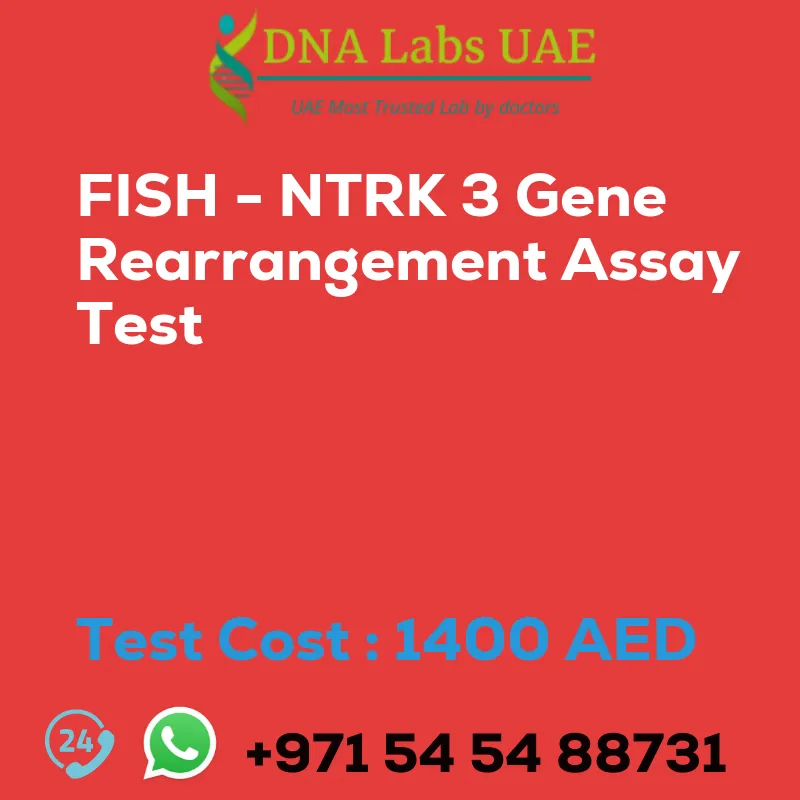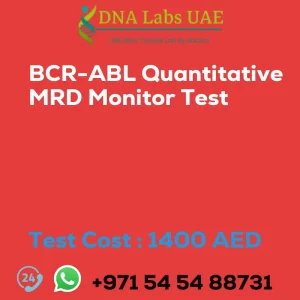FISH – NTRK 3 GENE REARRANGEMENT ASSAY Test
Test Cost: AED 1400.0
Symptoms, Diagnosis, and Referring Details:
- Test Name: FISH – NTRK 3 GENE REARRANGEMENT ASSAY Test
- Components: NTRK3 (15q25.3)
- Price: 1400.0 AED
- Sample Condition: Submit formalin fixed paraffin embedded tissue block or three 4 micron sections on Poly L Lysine coated slides. Ship at room temperature. Duly filled Genomics Clinical Information Requisition Form (Form 20) is mandatory.
- Report Delivery: Sample Daily by 6 pm; Report 4 Working days
- Method: FISH
- Test Type: Cancer
- Doctor: Oncologist
- Test Department: CYTOGENETICS
- Pre Test Information: Duly filled Genomics Clinical Information Requisition Form (Form 20) is mandatory.
Test Details:
The FISH (Fluorescence In Situ Hybridization) – NTRK 3 Gene Rearrangement Assay Test is a diagnostic test used to detect rearrangements in the NTRK 3 gene. This gene encodes for a protein called neurotrophic tyrosine kinase receptor 3 (NTRK3) which is involved in cell growth and differentiation. Rearrangements in the NTRK 3 gene can result in the fusion of the NTRK3 gene with another gene, leading to the production of a fusion protein. This fusion protein can then promote uncontrolled cell growth and division, potentially leading to the development of certain types of cancer.
The FISH – NTRK 3 Gene Rearrangement Assay Test uses fluorescent probes that specifically bind to the NTRK3 gene and the gene it is fused with. This allows for the visualization of any rearrangements or fusions involving the NTRK3 gene. The test is typically performed on a tissue sample obtained through a biopsy or surgical procedure.
The results of the FISH – NTRK 3 Gene Rearrangement Assay Test can help guide treatment decisions for patients with cancers that harbor NTRK 3 gene rearrangements. In recent years, targeted therapies that specifically inhibit the activity of the NTRK fusion proteins have been developed and approved for use in patients with NTRK fusion-positive cancers. Identifying NTRK 3 gene rearrangements through this test can help determine if a patient is a candidate for these targeted therapies.
| Test Name | FISH – NTRK 3 GENE REARRANGEMENT ASSAY Test |
|---|---|
| Components | *NTRK3 (15q25.3) |
| Price | 1400.0 AED |
| Sample Condition | Submit formalin fixed paraffin embedded tissue block or three 4 micron sections on Poly L Lysine coated slides. Ship at room temperature. Duly filled Genomics Clinical Information Requisition Form (Form 20) is mandatory. |
| Report Delivery | Sample Daily by 6 pm; Report 4 Working days |
| Method | FISH |
| Test type | Cancer |
| Doctor | Oncologist |
| Test Department: | CYTOGENETICS |
| Pre Test Information | Duly filled Genomics Clinical Information Requisition Form (Form 20) is mandatory. |
| Test Details |
The FISH (Fluorescence In Situ Hybridization) – NTRK 3 Gene Rearrangement Assay Test is a diagnostic test used to detect rearrangements in the NTRK 3 gene. This gene encodes for a protein called neurotrophic tyrosine kinase receptor 3 (NTRK3) which is involved in cell growth and differentiation. Rearrangements in the NTRK 3 gene can result in the fusion of the NTRK3 gene with another gene, leading to the production of a fusion protein. This fusion protein can then promote uncontrolled cell growth and division, potentially leading to the development of certain types of cancer. The FISH – NTRK 3 Gene Rearrangement Assay Test uses fluorescent probes that specifically bind to the NTRK3 gene and the gene it is fused with. This allows for the visualization of any rearrangements or fusions involving the NTRK3 gene. The test is typically performed on a tissue sample obtained through a biopsy or surgical procedure. The results of the FISH – NTRK 3 Gene Rearrangement Assay Test can help guide treatment decisions for patients with cancers that harbor NTRK 3 gene rearrangements. In recent years, targeted therapies that specifically inhibit the activity of the NTRK fusion proteins have been developed and approved for use in patients with NTRK fusion-positive cancers. Identifying NTRK 3 gene rearrangements through this test can help determine if a patient is a candidate for these targeted therapies. |








